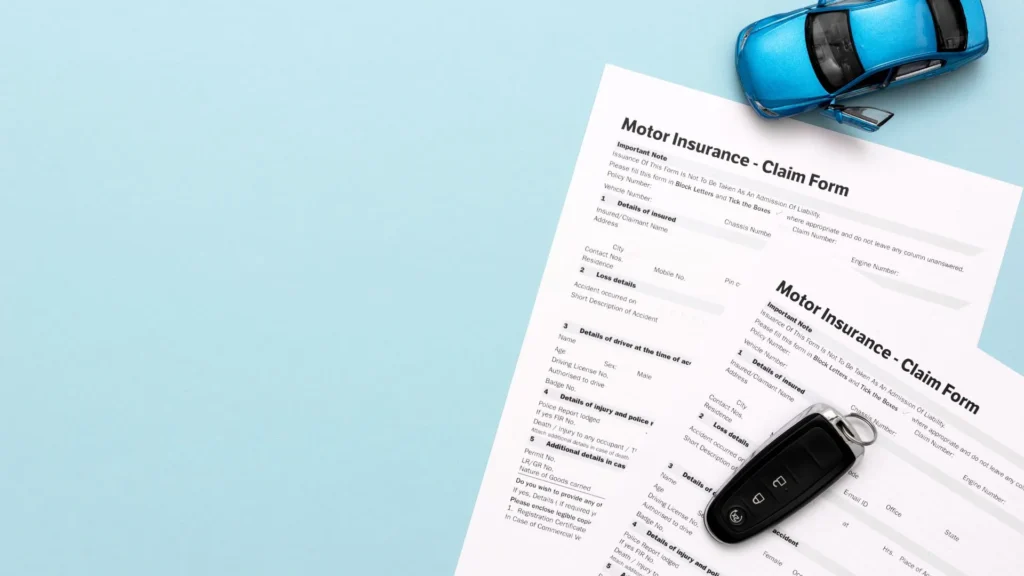Vehicle insurance can be complex, particularly when understanding terms like “deductible.” However, mastering such concepts can significantly impact your coverage and costs, helping you make informed decisions. This blog will delve into the crucial aspects of car insurance deductibles, how they influence your coverage, and the broader vehicle insurance industry.
What is a Deductible in Car Insurance?
A deductible in car insurance is the amount of money you will contribute to the insurer before the policy coverage kicks in. Your deductible can be either in exchange for a fixed sum or in proportion to your insurance cover.
It is a risk-sharing arrangement where you contribute first before your insurer covers the remainder as defined in your policy limit. A deductible is contracted when buying the policy, and premiums and high rates come with the smaller deductibles.It’s often deployed to auto-cover collision policies, which are compulsory when buying or taking out a loan. Most policies require medical liability insurance that usually doesn’t include the deductible.
You pay the deductible since the insurance company pays the remaining charges only after you have filed a claim. In short, it gives partiality to saving or paying the fees when your vehicle undergoes repair or when you get admitted to hospital, making premiums and coverage levels affordable.
How do Deductibles in Car Insurance Work?
An auto insurance deductible is a fixed amount you will pay in an insurance policy.
Let’s illustrate this with an example. If you have damage collision insurance for $500 and get involved in an accident, where the claim for repair amounts to $3,000, you would have to pay the $500 deductible, and the insurer would cover the remaining $2,500.
Auto insurance policies provide different deductibles for comprehensive and collision coverage, while customers can usually have the same amount. In contrast, liability deductibles are rarely part of liability coverage. For instance, some insurers may choose to cover damages like windshield damage immediately instead of the comprehensive deductible or the windshield warranty.
If you haven’t utilized your insurance amid no-fault accidents that necessitate a claim, choosing a low deductible could mean you end up paying more than your insurance, effectively setting a higher deductible.
This underlines the importance of striking the right balance between deductible and premium costs, while maintaining adequate protection.
Types of Deductibles in Car Insurance Policies
Car insurance premium plans provide different kinds of coverage, affecting the deductibles required from the policyholder. Here are the primary deductibles you can encounter:
Collision Coverage Deductible
This deductible applies to repair costs after an accident caused by colliding with another car or a stationary object, like a guardrail. Depending on your insurance policy, this deductible can vary from $0 to $1,000. Choosing a higher deductible for collision coverage can lower your premium, but you’ll have to cover more repair costs out of pocket if you have a claim.
Comprehensive Coverage Deductible
A deductible comprehensive coverage, including for hail, theft, or vandalism, is designed to take care of the repair of the car damage. Such deductibles range from $50 to $1,000, the National Association of Insurance Commissioners said, citing recent data of the National Insurance Group.
A higher deductible, like an excess repayment for the collision cover, reduces the insurance premium, but it can lead to higher out-of-pocket claims payments.
Personal Injury Protection (PIP) Deductible
PIP compensates the lost wages and medical expenses for those who have sustained injuries in an accident, irrespective of who is at fault. In some states, this is compulsory, and you must pay deductibles and copayments for your medical bills.
Uninsured Motorist Policy Deductible
This policy covers damages made by a driver who isn’t under insurance about the accident. Low deductibles for this coverage may be more desirable for those who benefit from minimizing the total cost of repair than for collision insurance, which is usually dictated by state laws and ranges from $150 to $500.
Choosing the Right Deductible for Your Car Insurance
Deciding on your vehicle insurance deductible is a crucial decision that can determine your financial stability during an accident. Here’s a full explanation of how to choose the right deductible amount.
Evaluate Your Budget
Decide on the amount you could cover with your money in case of an accidental event. A greater deductible will reduce your premiums and help you save money, but you’ll need to be capable of bearing the deductible cost when required.
Assess Your Risk
Analyze your driving record to decide whether it is necessary to record a claim for past scenarios. Consider that you will need the options of auto theft rates among locals, and the possibility of severe weather, which could damage your car.
Understand Premium Impact
The trade-off of choosing a higher deductible option is that although it can decrease premiums, it should prepare you for in-pocket expenses that could be higher before the coverage starts. Unlike the other option, obtaining a lower deductible means paying more premiums, but you will expend less of a financial burden if you file a claim.
Factor in Risk Tolerance
Know your tolerance for volatility and your tendency to minimize risk. Insurance works by sharing the financial risk among a group of policyholders. As the number of covered individuals in the scheme increases, the burden is spread over a greater number of people, thus making it more affordable for each person. An alternative to the lower deductible is to have a higher one if you feel that your ability to drive is excellent and you will make few requests to claim.
Consider State Regulations
Recall that deductibles may be a limiting factor in your choices, depending on the state. Insurers might require policyholders with claim histories to bear higher deductibles in certain states.
Review Policy Alternatives
Examine deductibles among insurers and rate their influence on valuation. Be adaptable, especially concerning your deductible, as your finances or individual risk profile expresses flexibility.
Read Related Article: What States Don’t Require Car Insurance?
Impact of Deductible on Car Insurance Premiums
- Insurance companies allow you to make deductible selections that directly determine your monthly premiums and the overall financial risk you will be at. Usually, a greater deductible implies a greater contribution to your initial expenditures, but the insurance only begins to cover the costs once the deductible is met.
- However, your premium usually decreases since you opt for the higher deductible. It ensures you’ll pay less on monthly premiums, but if a claim arises, you must pay more out of pocket. Selecting the lower deductible makes your premium higher, but commuting the financial obligation in case of an accident to a minimum is what it promises to you.
- Decide what you can afford before making any financial decision. Consider your budget, risk tolerance, and probability of you pushing a claim.
- Examine state rules that also concern the insurance or your deductible alternatives. After reviewing these criteria, you can opt for a deductible that caters to your financial needs and risk tolerance.
Comprehensive Vs. Collision Deductibles: What’s the Difference?
Collision coverage includes liability coverage for your car in an accident involving another vehicle or object, such as a tree or guardrail. Whether or not your car suffers a collision, the collision deductible shall be paid. This deductible is the sum you must pay out of pocket before the company takes up the lower part in the area needing repairs.
While coverage on a plan basis limits your car’s protection during non-collision accidents, exceptions such as theft, vandalism, fire, and other weather catastrophes like pail or floods, may be allowed. If you have an incident involving your vehicle being damaged by any of these incidents, you have no choice but to file a claim by clutching your comprehensive coverage.
Your deductible for comprehensive claims is different from the one for collision coverage insurance. Insurers offer various choices of deductibles, including zero dollars as minimum or up to $1,000 or even higher for both comprehensive and collision. When picking deductibles for the thorough and collision region, check your budget, tolerance level for the risk, and the possibility of incurring certain losses.
Read Related Article: What is a Declaration Page for Car Insurance?
When do you Pay a Deductible in Car Insurance?
Accepting the claim often involves paying the deductible mentioned in the policy. It’s a sum you must pay earlier than your insurer covering the cost of damage. Also, it’s a contribution people pay to the claim. There could be cases of an exemption when the car insurance deductible is not to be paid while filing a claim.
A driver will rarely be docked on a deductible for the incident in which the driver is not at fault. Also, the claims under liability insurance, for example, injuries and damage to the property when you are held liable, usually come without a deductible payment, provided policy limits exclude the sum of the claim.
For example, certain insurers offer deductibles that drop consecutively for drivers who don’t have any accidents. The drawdown plan promotes safe driving by choosing a discount or giving up the exclusionary deposit. Thus, drivers evade crashes.
A significant deductible can get you a cheaper premium, while a smaller one would mean you pay more monthly money for your insurance policy. However, it also means that in the event of an accident, you’ll have to foot a greater portion of the bill. Decide on a deductible coupled with a budget that matches your tolerable risk and the affordability of the coverage.
Misconceptions About Car Insurance Deductibles
One of the most common inaccuracies regarding a vehicle insurance deductible is that an insurer always pays it. It is a common misapprehension that an insurance plan with a higher deductible will result in a lower premium. While paying higher deductibles will help cut down the monthly rates, one will still have to take the financial burden of carrying a more significant part of the expense in the case of an insurance claim.
Another driver’s liability may be reported if the claim is not reported under liability insurance, so paying your deductible will not be necessary. Equally, some believe that submitting an insurance claim always causes higher premiums. Finally, there is the fallacy that all deductibles are fixed. Different insurance plans include declining deductibles, which reward safe driving with lower deductible amounts over time.
How do Deductibles Affect Claim Outcomes?
Deductibles affect vehicle accident claims in many ways. For instance, the type of deductible influences the financial obligations of the insured. When a deductible is higher, the extra portion of costs that appear at the time of the claim can be more significant. In contrast, a plan with a lower deductible might fetch you favorable compensation at the time of the accident, but in most cases, the premium will then be increased.
Consumer deductible is another factor that determines whether a claim may be submitted. Therefore, consumers must understand deductibles and their consequences.
Read Related Article: Why Do You Need Car Insurance ? – Know the Reasons
Conclusion
Everyone must understand car insurance deductibles, as it helps save money. This helps you decide between a cheap policy that may not cover your cost and an expensive one that can.
Beem comes in handy for people needing financial support. In Beem, you have the opportunity to accurately deal with insurance deductibles, saving you the hassle of addressing unforeseen situations.




























